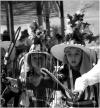Abstract
The following article is the result of a research conducted in the archives of the Organization of the United Nations Educational,Scientific and Cultural Organization (Unesco) aiming to determin the origin of what is considered to be Intangible Cultural Heritage.In order to achieve this, I considered intangible heritage as a transnational power dispositive, following the faucouldiansense of the term. Consequently, I based my study on the works of a selection of notorious French anthropologists. Intangibleheritage is a complex cultural phenomenon and when applied to a policy of global range, it results in a juxtaposition of local,national and transnational interests. Its failed emergence as a part of international copyright norms revealed its inconsistencywith the postulate of the Occidental liberal doctrine. However, its recent adoption as a new asset notion seems to create a newrange of possibilities for the interpretation of its value and its multiple political applications.Apuntes is registered under a Creative Commons Attribution 4.0 International Public License. Thus, this work may be reproduced, distributed, and publicly shared in digital format, as long as the names of the authors and Pontificia Universidad Javeriana are acknowledged. Others are allowed to quote, adapt, transform, auto-archive, republish, and create based on this material, for any purpose (even commercial ones), provided the authorship is duly acknowledged, a link to the original work is provided, and it is specified if changes have been made. Pontificia Universidad Javeriana does not hold the rights of published works and the authors are solely responsible for the contents of their works; they keep the moral, intellectual, privacy, and publicity rights.
Approving the intervention of the work (review, copy-editing, translation, layout) and the following outreach, are granted through an use license and not through an assignment of rights. This means the journal and Pontificia Universidad Javeriana cannot be held responsible for any ethical malpractice by the authors. As a consequence of the protection granted by the use license, the journal is not required to publish recantations or modify information already published, unless the errata stems from the editorial management process. Publishing contents in this journal does not generate royalties for contributors.


